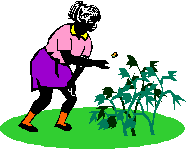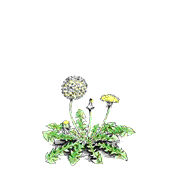| A Natural Lawn Care Herbicide - Corn Gluten Meal:
Corn gluten meal prevents sprouting seeds
from developing normal roots. This does not directly kill the
seedlings, but makes them susceptible to dehydration if the soil
gets dry. Established plants are not affected. |
Pesticide.org - Northwest Coalition for Alternatives to Pesticide
 |
| Growing Houseplants Without Using Pesticides:
...about 75 percent of American families have plants in their homes.
Occasionally these plants have problems with pests, but itís not
necessary to use pesticides when this happens. |
Pesticide.org -
Northwest Coalition for Alternatives to Pesticide
 |
| Tilling the Garden at Night: Some weeds won't germinate
except in daylight. Studies have shown that tilling the garden at night can significantly
reduce weed germination from seeds already in your soil. Keeping your hoes, weed twisters
and pullers clean by washing them off after use will also keep tiny seeds from following
your tracks. This goes for you boots or gardening shoes, as well.
|
There's more
to weeds than weeding, says Chapel Hill horticulturist - newsobserver.com February 15, 2015
|
| Vinegar as an Organic Weed Killer: A
recent articles have sparked a lot of local interest
in the promise of vinegar as an herbicide. Yes, even regular
household vinegar works! Since the number of organic products
available for killing unwanted weeds is extremely limited, the
vinegar solution is a most welcome addition. |
The Garden Counselor
Need Better Weeding Tools for Protecting Organic
Crops?
 |
| Weed out those 'plants out of place' organically:
I get many questions about how to control weeds in lawns and gardens
organically and selectively. Honestly, that presents a challenge,
but with a little patience and dedication, satisfactory results are
achievable. |
HeraldTribune.com, Joe Lamp'l DIY Network July 22, 2007
 |
|
|
| The Pesticide Problem: The City of
Bellevilleís current battle over creating a pesticide bylaw is not
an isolated one. The war on pesticides is currently being fought in
council chambers and public meetings across this country (Canada).
To date, an estimated 125 municipalities in six provinces have
pesticide bylaws. |
Your Earth Blogspot, Suzanne Elston March 13, 2007
 |
| Caring for your lawn naturally: For many
homeowners, a healthy, lush lawn is a top priority throughout the
spring and summer seasons. If done right, it can be maintained all
season long using natural methods and products. Use
weeding tools to remove isolated weeds. |
OttawaCitizen.com News Canada April 10, 2008
 |
| Organic weed control: In order to become more
"green" in our gardening practices, many of us have adopted new
gardening practices and abandoned some of the products that we once
used exclusively in favor of more "earth-friendly," organic ones.
The one area that is the hardest to change for most gardeners is the
use of potent herbicides in weed control. |
Mail Tribune - Southern Oregon's News Source, Stan Mapolski April
18, 2008
 |
| Natural Weed Control? A
thick cover of native plants, such as the potentilla and
strawberries shown here, can help to choke out weeds. However, corn
gluten looks like a promising way to prevent weed seeds from
germinating in early spring, when coverage may not be so lush. |
Wild Flora's Wild Gardening July 15, 2007
Need Better Weeding Tools for Natural Weed Control?
 |
| Grass Warfare: Is what you put on your lawn
your own business? Growing local movements say using pesticides is a
choice that affects the whole neighborhood. The battle over how
'green' your grass should be. Neighborhood activists argue that
using pesticides on one lawn exposes everyone nearby to the
chemicals, including kids and pets. See
video. |
The Wall Street Journal Online, Gwendolyn Bounds, July
7, 2007
 |
| Dandelions? I think I already know the answer,
but does anyone know of any ecofriendly tips for killing them? I've
been digging them out 'til my back hurts......and the next day the
yard will be covered with a new crop of blooms. I really don't like
using harsh chemicals but wouldn't be above trying something less
draconian......that wouldn't kill surrounding grass, if there is
such a miracle out there, which I doubt. But you never know;
Y!Answers has surprised me before! ..There is a tool called a weed
puller... |
Yahoo! Answers: Best Answer - Chosen By Voters
April, 2007
Need Better Weeding Tools for Safely Removing
Dandelions?

|
| Looking for the ultimate tool for digging up
bulbous weeds like wild garlic and taproot weeds? I'm
looking for the ultimate tool for digging up bulbous weeds like wild
garlic and taproot weeds. So far the asparagus knife (shaped like a
straightened snake tongue attached to a handle) seems to work the
best but this is very time consuming and requires a "pry angle" that
requires space I do not always have... and the
weed twister is a
good idea. |
Yahoo! Answers: Best Answer - Chosen By Voters March, 2007
 |
| The Zen of Weeding: An hour passes, then
another. There is no world beyond this third of a suburban acre and
the rhythm of pulling up crabgrass. Now the only solution, except to
let nature take its unruly course, is to get down and dirty. Sweat
is dripping onto my glasses. A blister is rising on a couple of
fingertips. (See also Zen Weeding
from Ergonica) |
The Boston Globe, John Powers September 21, 2003
 |
| Alternative Weed and Pest Control: For years,
now we have heard about the negative impact of Pesticides on the
environment. The professional users of pesticides are responsible
applicators using them in a safe and appropriate manner. It has been
the non-professional users who have gotten us in trouble...There are
a lot of alternatives available, for example you can use a Dandelion
Popper,
Weed Twister, Ergo Weeder, Garden Hoe, Scuffle Hoe, Circle
Hoe or Deck Flosser. |
Bruce Zimmerman brucezimmerman.com
 |
| The Art of Weeding: Part 1 - A year-round
strategy for organic weed control - Here are some helpful tips
to make life with weeds a little easier. In this article, we'll
discuss how weeds impact your garden and how to stop their advance.
Weeding might be considered a nasty chore, but it's a great way to
really get to know what's going on in your garden. |
Marion Owen,
Fearless Weeder for
PlanTea, Inc. and
Co-author of Chicken Soup for the Gardener's Soul
 |
| The Art of Weeding: Part 2 - A year-round
strategy for organic weed control - In this article, we'll learn
how to get rid of weeds, naturally, tools for the job and how weeds
can even be good for you and your garden. In the garden, the bigger
the weeds, the harder it is to control them. The first step to
controlling weeds is to get into the habit of going on patrol in
your garden. |
Marion Owen,
Fearless Weeder for
PlanTea, Inc. and
Co-author of Chicken Soup for the Gardener's Soul
Need Better Weeding Tools for Protecting Organic
Crops?
 |
| A Primer on the disease Late Blight : There
is no magic bullet for late blight. Good garden cleanup, crop
rotations, and removing diseased plant material will all help; but
the spores are so mobile that there are no guarantees. Removing all
weedy varieties of nightshade is a good idea. It is also a good idea
to pull any volunteer potato plants as soon as they appear,
to minimize the possibility of infected plants spreading the
disease. |
The
Westside Gardner, FAQ Regarding Late Blight by Travis Saling

|
| Pick A Peck of (Air)
Potatoes: Itís potato-picking
time! No, itís not time to harvest the "roots" of your garden
labors, but it is time to prevent the spread of one of our most
difficult weed problems. Air Potatoes are a killer vine that
can even out-compete kudzu. With springís arrival, it is
ready to begin to grow over your favorite landscape plants and take
over our roadsides and natural areas. |
University of Florida, Okeechobee County Extension Service, Dan
Culbert - Extension Horticulture Agent March 7, 2004
 |
| Companion Planting - a Complete Guide to Growing
Healthy Plants: Organic methods to use companion plants to
control pests without the need for toxic chemicals. Special
e-book you can download for $9.57. Learn how to create an
organic food system where your plants do the work and provide a
healthier lifestyle for you and your family. |
Companion
Planting - a Complete Guide to Growing Healthy Plants
 |
| Try a Long-Handled Diamond Hoe for Weeding:
Many of the hoes commonly used for weeding can strain your back,
neck, shoulders, and arms because they force you to adopt a stooped
position. Consider a long handled diamond hoe instead of what you
currently use. |
University of Wisconsin Healthy Farmers, Healthy Profits Project,
Dec. 2001; Second Edition.by Astrid Newenhouse, Bob Meyer, Marcia
Miquelon and Larry Chapman
 |
 Weed Control Methods and
Science Presented by Ergonica
Weed Control Methods and
Science Presented by Ergonica



